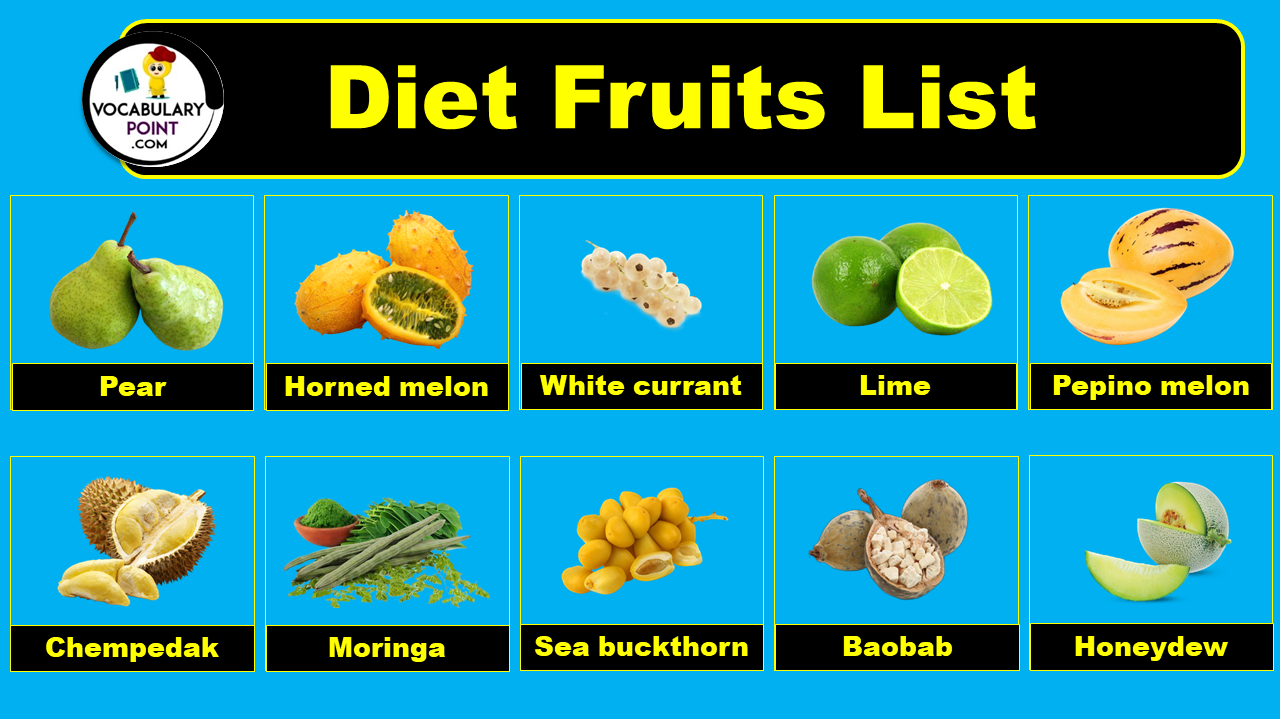Are you tired of the same old fruits on your diet plan? Are you looking for a variety of delicious and nutritious options that will help you reach your health goals? Look no further! In this article, we have compiled an extensive diet fruit list that will not only satisfy your cravings but also provide essential vitamins, minerals, and antioxidants. From the exotic dragon fruit to the humble apple, these fruits offer a range of flavors and textures that are sure to keep your taste buds excited. So get ready to explore new fruity delights and take your diet to a whole new level!
Diet Fruit List
Yuzu
A citrus fruit from East Asia, resembling a small grapefruit with an uneven skin, known for its distinctive, fragrant flavor.
Jaboticaba
A Brazilian grape-like fruit that grows directly on the trunk of its tree, featuring a sweet, plum-like taste.
Baobab
The fruit of the Baobab tree, found in Africa, Australia, and the Middle East, known for its hard outer shell and nutrient-rich, powdery inside.
Pear
A sweet, bell-shaped fruit that has a wide variety of types, known for its crisp or soft texture depending on the variety.
Miracle Fruit
A berry that, when eaten, causes sour foods subsequently consumed to taste sweet due to miraculin.
Horned Melon
Also known as kiwano, a fruit with a spiky outer skin and bright green, jelly-like inside with a banana-lime flavor.
Pomegranate
A red fruit with a tough outer layer containing sweet, juicy seeds known as arils.
Mulberry
A sweet fruit that comes in multiple colors, including white, red, and black, resembling elongated raspberries.
Fig
A soft, sweet fruit, containing multiple small seeds, eaten fresh or dried.
Papaya
A tropical fruit with a sweet taste, vibrant orange color, and a variety of health benefits.
Chayote
A green, wrinkled fruit often used as a vegetable in salads, soups, and stews, with a mild cucumber-like flavor.
Ackee
A tropical fruit from Jamaica, toxic if improperly eaten, but safe and delicious when ripe and properly prepared.
Blueberry
A small, round, blue-purple berry known for its sweet taste and numerous health benefits.
Apple
A popular fruit with a sweet to tart taste, available in many varieties and colors, from red to green to yellow.
Sea Buckthorn
A bright orange berry known for its sour, tart flavor and high vitamin C content.
Finger Lime
A cylindrical fruit, known for its caviar-like citrus pearls, used as a garnish or flavoring.
Kumquat
A small, oval citrus fruit, eaten whole, with a sweet edible peel and tart flesh.
Plum
A juicy fruit with a variety of colors and flavors, ranging from sweet to tart.
Salak
Also known as snake fruit, with a reddish-brown scaly skin and a sweet, tangy flavor similar to pineapple and banana.
Durian
A large, spiky fruit known for its strong odor, unique taste, and creamy texture.
Tangerine
A small citrus fruit with a deep orange color, known for its sweetness and juiciness.
Banana
A long, yellow fruit with soft, sweet flesh, high in potassium and easily digestible.
Red Currant
A small, tart berry used in jams, jellies, and desserts, known for its bright red color.
Loquat
A small, round fruit with a sweet, tangy flavor, similar to apricot and plum, with yellow or orange skin.
Clementine
A type of mandarin orange with a deep orange color, sweet taste, and easy-to-peel skin.
Buddha’s Hand
A unique citrus fruit with a segmented, finger-like appearance, used primarily for its zest and fragrance.
White Currant
A sweet, pale yellow or white berry, less acidic than its red and black counterparts, used in cooking and baking.
Sapodilla
A tropical fruit with a grainy, sweet, pear-like taste, known for its brown, sandy skin.
Kiwi
A small fruit with fuzzy brown skin and bright green or yellow flesh with tiny, edible black seeds.
Elderberry
A small, dark purple berry known for its use in syrups and remedies for colds and flu.
Nectarine
A smooth-skinned fruit similar to a peach, with a firm, juicy flesh and a sweet flavor.
Acai Berry
A small, dark purple berry from the Amazon, celebrated for its antioxidant properties and used in smoothies and bowls.
Grapefruit
A large, tart citrus fruit with a segmented interior, available in pink, red, and white varieties.
Blackberry
A soft, black fruit made up of many smaller drupelets, known for its sweet, slightly tart taste.
Surinam Cherry
A tropical fruit with a pumpkin shape, ranging in color from green to dark red, with a sweet-tart flavor.
Rollinia
A tropical fruit related to the custard apple, with spiky green skin and creamy, sweet flesh.
Apricot
A small, orange fruit with velvety skin and flesh not too juicy but very smooth and sweet.
Raspberry
A soft, red or black fruit composed of many connecting drupelets, known for its sweet, slightly tart flavor.
Wampee
A tropical fruit resembling a small grapefruit with a sweet and slightly acidic flavor, native to Southeast Asia.
Lime
A green citrus fruit known for its acidic juice and bright, zesty flavor.
Cranberry
A small, tart, red berry often used in juices, sauces, and as a dried fruit snack.
Kiwano
Also known as horned melon, with spiky orange skin and green, jelly-like flesh with a cucumber-banana taste.
Buddha’s Belly Fruit
Not widely recognized; possibly a misunderstanding or local name for a fruit.
Pineapple
A tropical fruit with rough, spiky skin and sweet, juicy, yellow flesh.
Black Sapote
Known as the chocolate pudding fruit, with dark, creamy flesh that tastes like chocolate.
Lemon
A yellow citrus fruit known for its sour taste, used in cooking and as a garnish.
Watermelon
A large, green fruit with a red or yellow, sweet, juicy interior filled with seeds.
Monk Fruit
A small, round fruit used as a sweetener, known for its sweetness without the calories of sugar.
Pawpaw
A North American fruit with a creamy texture and tropical taste, similar to banana and mango.
Grape
A small, sweet fruit grown in clusters on vines, available in varieties from red to green to purple.
Guanabana
Also known as soursop, a fruit with a spiky green exterior and sweet, creamy flesh, often used in beverages.
Cantaloupe
A type of melon with orange flesh and a netted skin, known for its sweet flavor.
Avocado
A creamy, green fruit used in savory and sweet dishes, rich in healthy fats and nutrients.
Mamey Sapote
A tropical fruit with a rough brown skin and sweet, reddish-orange flesh, resembling a cooked sweet potato.
Moringa
Technically not a fruit but a plant; its leaves and pods are edible, known for their nutritional benefits.
Dragonfruit
A vibrant pink or yellow fruit with white or pink flesh dotted with black seeds, with a mild, sweet taste.
Boysenberry
A large, juicy berry with a deep purple color, known for its sweet and slightly tart flavor.
Cactus Pear
Also known as prickly pear, a fruit from the cactus with a sweet, melon-like flavor.
Cloudberry
A rare, amber-colored berry from cold climates, with a unique tart flavor, used in jams and desserts.
Soursop
A fruit with a spiky green exterior and soft, sweet flesh, believed to have medicinal properties.
Guava
A tropical fruit with a sweet, fragrant flesh, ranging in color from white to pink.
Strawberry
A red, heart-shaped berry with a sweet taste and a fragrant aroma, popular worldwide.
Kakadu Plum
An Australian superfruit known for its extremely high Vitamin C content and antioxidant properties.
Rambutan
A tropical fruit with hairy skin and juicy, sweet flesh, similar in taste to lychee.
Coconut
A large, brown fruit with a hard shell enclosing milky liquid and rich, white flesh.
Gooseberry
A small, sour fruit encased in a papery husk, varying in color from green to purple.
Ugli Fruit
A citrus fruit with a rough, greenish-yellow skin, known for its sweet, tangy flavor.
Lychee
A small, round fruit with a sweet, perfumed flavor inside a rough, red outer skin.
Pitanga
Also known as Surinam cherry, a small, red fruit with a tart flavor, used in jams and jellies.
Breadfruit
A large, tropical fruit used as a vegetable in cooking, with a texture similar to bread when cooked.
Orange
A popular citrus fruit known for its sweet, juicy segments and high vitamin C content.
Chempedak
A tropical fruit similar to jackfruit, with sweet, fragrant flesh, found in Southeast Asia.
Jujube
A small, red or green fruit, also known as red date, with a sweet, apple-like flavor when ripe.
Starfruit
A tropical fruit with a star shape when cut, having a sweet and slightly tart flavor.
Tamarillo
Also known as tree tomato, a fruit with a sweet yet tangy flavor, used in cooking and baking.
Loganberry
A hybrid fruit of blackberry and raspberry, known for its dark red color and sweet taste.
Marionberry
A type of blackberry with a slightly tart flavor, known for its use in pies and jams.
Black Currant
A small, tart berry rich in vitamins and antioxidants, often used in jams and liqueurs.
Honeydew
A sweet melon with a smooth, pale green flesh and a round to slightly oval shape.
Custard Apple
A sweet, tropical fruit with a green, knobby skin and creamy, custard-like flesh.
Mango
A tropical fruit with a sweet, juicy flesh and a distinct, fragrant sweetness.
Fruits High In Carbs
Quince
A yellow fruit that is firm and sour when raw but becomes sweet and fragrant when cooked.
Feijoa
A green, ellipsoid fruit with a sweet, aromatic flavor, often eaten by cutting in half and scooping out the flesh.
Cherry
A small, round stone fruit with a sweet or tart flavor, available in many varieties.
Longan
A tropical fruit similar to lychee, with translucent flesh and a sweet, floral taste.
Passionfruit
A round fruit with a hard outer shell and a juicy, seed-filled interior, known for its sweet-tart flavor.
Plantain
A starchy fruit similar to a banana, often cooked before eating, used in many tropical cuisines.
Ylang-ylang Fruit
Not typically recognized for its fruit; ylang-ylang is more known for its fragrant flowers used in perfumery.
Jackfruit
The largest tree-born fruit, known for its sweet, fleshy pods and versatile use in both sweet and savory dishes.
Peach
A soft, juicy fruit with fuzzy skin and sweet flesh, ranging in color from white to yellow or red.
Pepino Melon
A sweet, melon-like fruit with yellow and purple stripes on its skin and a light, cucumber-like texture.
Persimmon
A sweet fruit with a honey-like flavor, available in astringent and non-astringent varieties.
Explore More Fruits Names:
Hard Fruits | Sweet Fruits | Malaysian Fruits
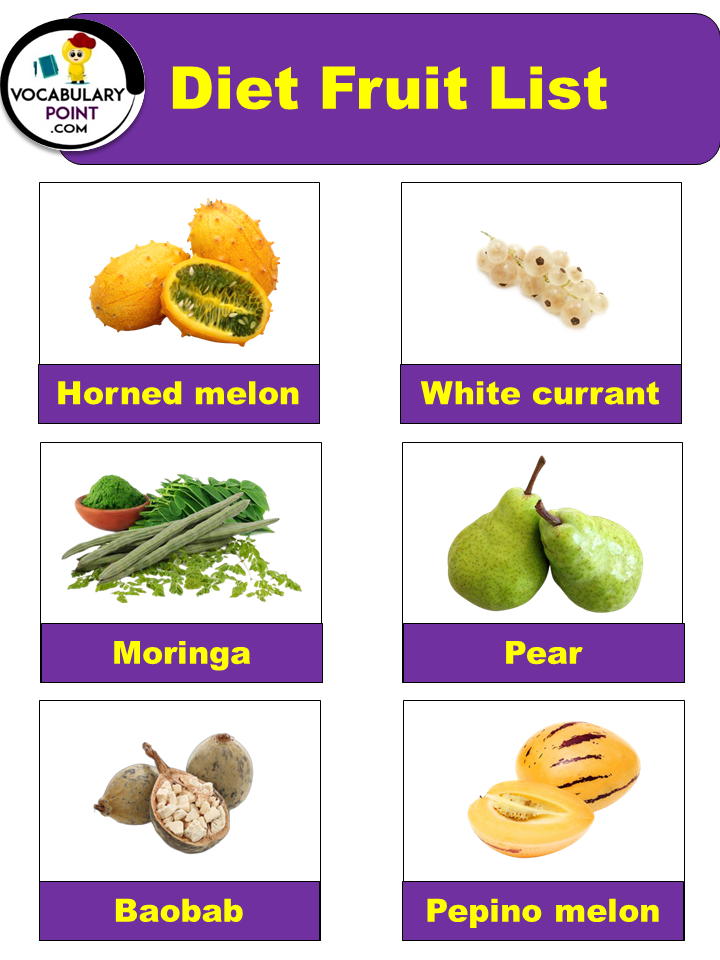
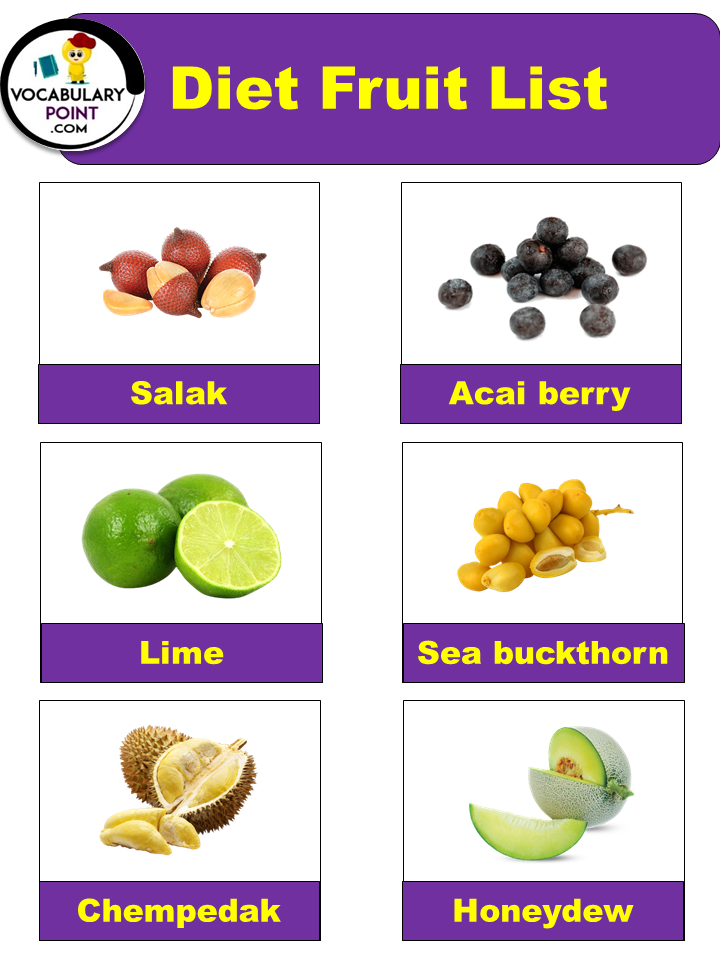
High Fiber Vegetables List
Salak
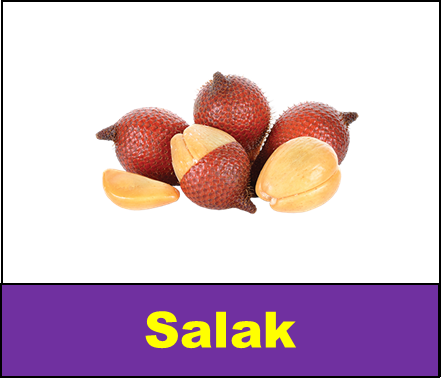
- Rich in Nutrients:
Salak is packed with essential nutrients, including vitamins, minerals, and dietary fiber, making it a nutritious addition to the diet.
Acai berry
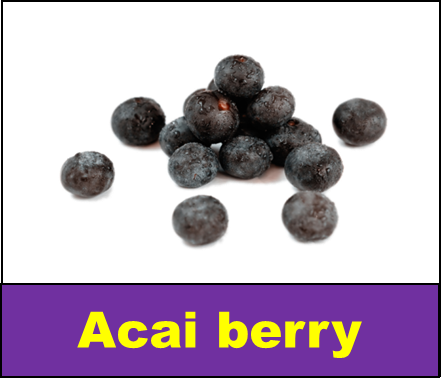
- Antioxidant Power:
Acai berries are renowned for their high antioxidant content, particularly anthocyanins. These antioxidants help protect cells from oxidative damage, reduce inflammation, and support overall health.
Lime
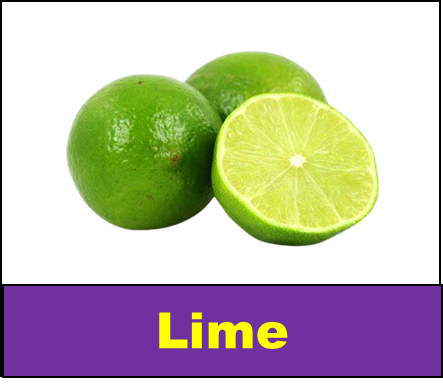
- Rich in Vitamin C:
Limes are a great source of vitamin C, a crucial nutrient that supports the immune system, promotes healthy skin, and acts as an antioxidant to protect cells from damage.
Sea buckthorn
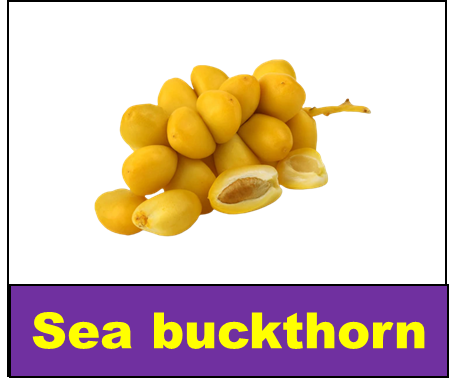
- Rich in Antioxidants:
Sea buckthorn is abundant in antioxidants like vitamin C and flavonoids, which protect cells from oxidative damage, reduce inflammation, and support overall well-being.
Chempedak
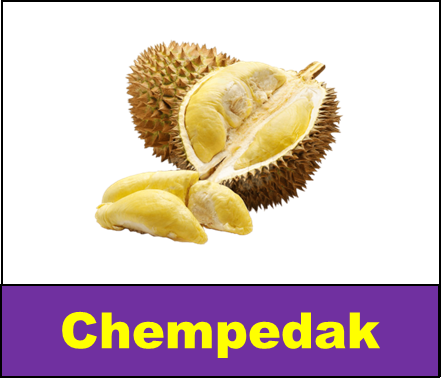
- Rich in Nutrients:
Chempedak is packed with essential nutrients, including vitamins, minerals, and dietary fiber, making it a nutritious addition to the diet.
Honeydew
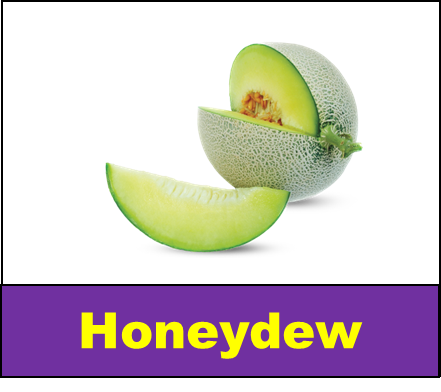
- Hydration:
Honeydew has a high water content, making it an excellent choice for maintaining proper hydration, particularly during hot weather or physical activities.
Horned melon
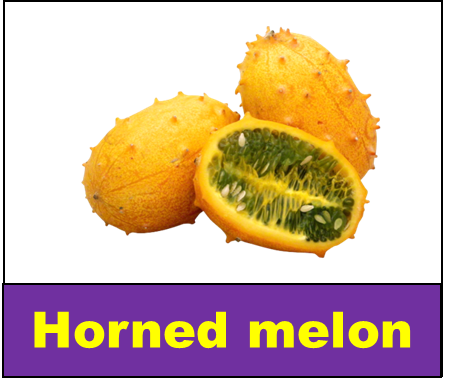
- Rich in Vitamin C:
Horned melon is a good source of vitamin C, a vital nutrient that supports the immune system, promotes healthy skin, and acts as an antioxidant to protect cells from damage.
White Currant
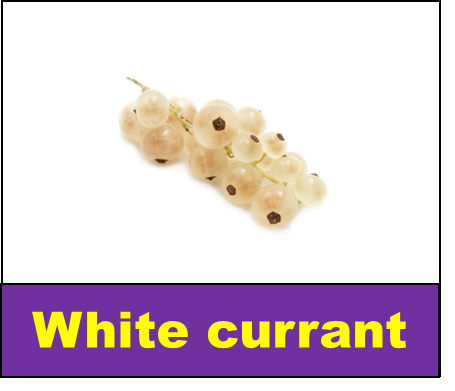
- Rich in Vitamins:
White currants are a good source of essential vitamins, particularly vitamin C and vitamin A, which contribute to immune function, healthy skin, and overall well-being.
Moringa
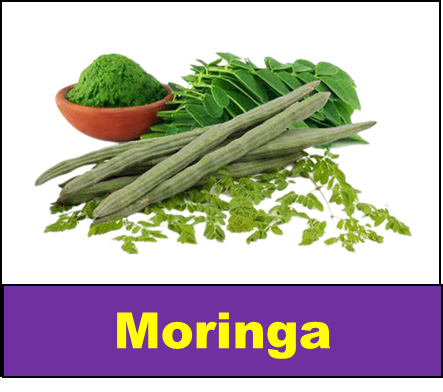
- Nutrient-Rich:
Moringa is packed with essential nutrients, including vitamins (e.g., vitamin C, vitamin A), minerals (e.g., iron, calcium), and protein, making it a highly nutritious addition to the diet.
Pear
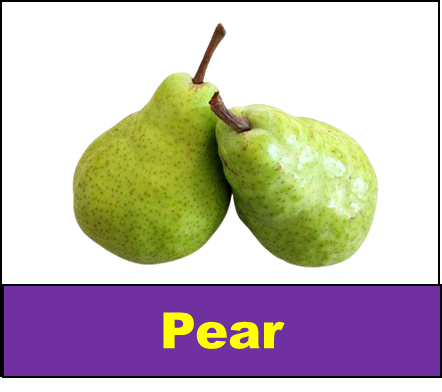
- Dietary Fiber:
Pears are rich in dietary fiber, aiding digestion, promoting regular bowel movements, and contributing to a healthy gastrointestinal system.
Baobab
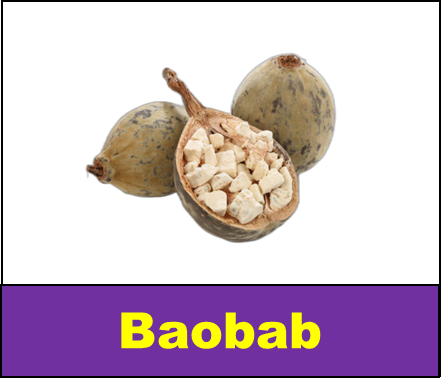
- Rich in Vitamin C:
Baobab is a potent source of vitamin C, a crucial nutrient that supports the immune system, promotes collagen production for healthy skin, and acts as an antioxidant to protect cells from damage.
Pepino melon
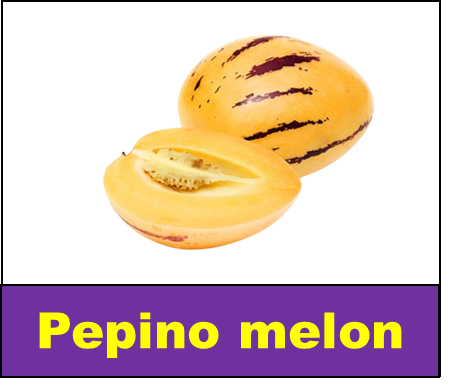
- Low in Calories:
Pepino melon is low in calories, making it a healthy and satisfying snack option for those looking to manage their calorie intake.
